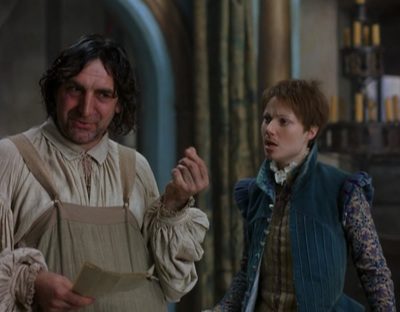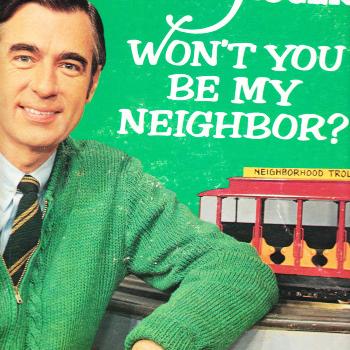A shorter, funnier version of everything I tried to say in the previous post can by found in Marc Norman and Tom Stoppard’s script for Shakespeare in Love:
WOMAN (to RALPH): And what is this play about?
RALPH: Well, there’s this nurse. …
The play Ralph is describing is Romeo and Juliet.
 Now, if Ralph were writing a paper for his literature class on the meaning of Romeo and Juliet, he’d likely get an “F” for this approach. Similarly, no editor would accept a review of the play from a critic who argued that the whole thing was really about the nurse. And if you met some member of the audience coming out of the theater who told you, “Well, it’s about this nurse …” you would think they hadn’t been paying any attention at all.
Now, if Ralph were writing a paper for his literature class on the meaning of Romeo and Juliet, he’d likely get an “F” for this approach. Similarly, no editor would accept a review of the play from a critic who argued that the whole thing was really about the nurse. And if you met some member of the audience coming out of the theater who told you, “Well, it’s about this nurse …” you would think they hadn’t been paying any attention at all.
But Ralph isn’t writing an abstract paper for a class. And he isn’t a critic reviewing the play, or a spectator in the audience.
Ralph is an actor — a member of the cast.
And, more importantly, Ralph is the actor playing the Nurse.
And if you are the actor playing the Nurse in Romeo and Juliet, then that is the correct response to the question, “What is this play about?” It’s about this nurse.
That’s not the whole answer, or the only answer, or the best answer, or the most comprehensive answer. It is certainly the wrong answer for the student, for the teacher, for the critic, for the audience, for the playwright, for the director, for the publicist and for the rest of the cast.
But it is a necessary answer for the actor whose role it is to be the nurse.
If you’ve never had to play the nurse — or the butler, or the sidekick, or Fortinbras, or Third Woman in Crowd — then you might not understand Ralph’s answer to the question Does the Universe Have a Purpose? “What is this play about?” You might think he’s a raging egomaniac with no sense of perspective or proportion — an illiterate fool who doesn’t understand the first thing about Romeo and Juliet.
But he understands all of that, and he understands his part in the bigger picture. “There’s this nurse …” is an expression of humility, not ego. It’s a recognition that I’m not the playwright, or the director, or even one of the leads, but I have a role to play and I’m going to play it with everything I’ve got.
But still and again, this is a choice, not a conclusion based on evidence.
“There are no small parts,” someone said, “just small actors.” That’s a statement of faith — an aspirational pledge and not anything that any reasonable person could reasonably affirm based on an objective survey of scripts and screenplays through the ages. But it’s still good advice.












